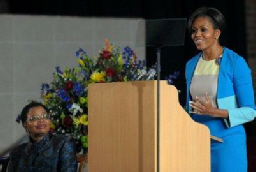 10:16 A.M. (Local)
10:16 A.M. (Local)
MRS. OBAMA: Thank you. Thank you so much. It is such a pleasure and an honor to be here with all of you today.
I want to start by thanking Graca Machel for that just gracious, kind introduction. It is overwhelming. And I want to thank her for her lifetime of service as a champion for women and children. And from the bottom of my heart, I want to thank you for all of the kindness and generosity that you have shown my family for our visit here. Thank you so much. (Applause.)
I am also honored to share the stage with another remarkable leader, Baleka Mbete. (Applause.) She has played a vital role in advancing equality and promoting development here in South Africa. Thank you to the both of you for joining us here for sharing this moment with all of us.
I also want to thank the Archbishop of Johannesburg for honoring us today with his presence.
And of course, I want to recognize our guests of honor –- these 76 extraordinary young women leaders from here in South Africa and across the continent. (Applause.)
These are young women transforming their communities and their countries, and let me tell you I am so impressed by all of them. I am so proud of everything they have achieved.
And finally, I want to thank the leaders and the congregation of Regina Mundi for hosting us in this sacred space today. It has been more than three decades, but those bullet holes in the ceiling, this broken altar still stand as vivid reminders of the history that unfolded here.
And you all know the story –- how 35 years ago this month, a group of students planned a peaceful protest to express their outrage over a new law requiring them to take courses in Afrikaans. Thousands of them took to the streets, intending to march to Orlando Stadium.
But when security forces opened fire, some fled here to this church. The police followed, first with tear gas, and then with bullets.
And while no one was killed within this sanctuary, hundreds lost their lives that day, including a boy named Hector Pieterson, who was just 12 years old, and Hastings Ndlovu, who was just 15.
Many of the students hadn’t even known about the protest when they arrived at school that morning. But they agreed to take part, knowing full well the dangers involved, because they were determined to get an education worthy of their potential.
And as the Archbishop noted, that June day wasn’t the first, or the last, time that this church stood in the crosscurrents of history. It was referred to as “the parliament of Soweto.” When the congregation sang their hymns, activists would make plans, singing the locations and times of secret meetings. Church services, and even funerals, often became anti-Apartheid rallies. And as President Mandela once put it, “Regina Mundi became a world-wide symbol of the determination of our people to free themselves.”
It is a story that has unfolded across this country and across this continent, and also in my country — the story of young people 20 years ago, 50 years ago, who marched until their feet were raw, who endured beatings and bullets and decades behind bars, who risked, and sacrificed, everything they had for the freedom they deserved.
And it is because of them that we are able to gather here today. It is because of them that so many of these young women leaders can now pursue their dreams. It is because of them that I stand before you as First Lady of the United States of America. (Applause.) That is the legacy of the independence generation, the freedom generation. And all of you -– the young people of this continent -– you are the heirs of that blood, sweat, sacrifice, and love.
So the question today is, what will you make of that inheritance? What legacy will you leave for your children and your grandchildren? What generation will you be?
Now, I could ask these questions of young people in any country, on any continent. But there is a reason why I wanted to come here to South Africa to speak with all of you.
As my husband has said, Africa is a fundamental part of our interconnected world. And when it comes to the defining challenges of our times –- creating jobs in our global economy, promoting democracy and development, confronting climate change, extremism, poverty and disease — for all this, the world is looking to Africa as a vital partner.
That is why my husband’s administration is not simply focused on extending a helping hand to Africa, but focusing on partnering with Africans who will shape their future by combating corruption, and building strong democratic institutions, by growing new crops, caring for the sick. And more than ever before, we will be looking to all of you, our young people, to lead the way.
And I’m not just saying that to make you all feel good. (Laughter.) The fact is that in Africa, people under 25 make up 60 percent of the population. And here in South Africa, nearly two-thirds of citizens are under the age of 30. So over the next 20 years, the next 50 years, our future will be shaped by your leadership.
And I want to pause for a moment on that word -– leadership — because I know that so often, when we think about what that word means, what it means to be a leader, we think of presidents and prime ministers. We think of people who pass laws or command armies, run big businesses, people with fancy titles, big salaries.
And most young people don’t fit that image. And I know that often when you try to make your voices heard, sometimes
